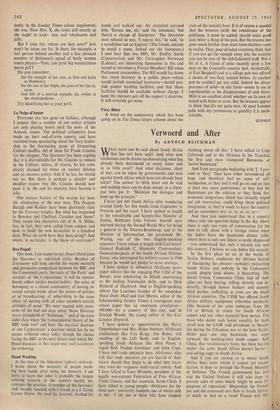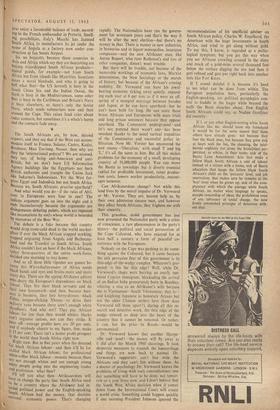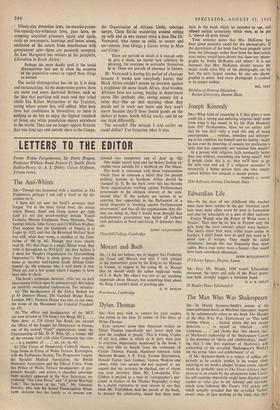Verwoerd and After
By ARNOLD BEICHMAN
WHAT more can be said about South Africa that has not been said? And what new resolutions can be drawn up denouncing what has already been denounced so many times and to so little avail? And what decisions, short of war, can be taken by governments and men against South Africa which have not already been
taken? The • answer is—little more can be said and-nothing more can be done except, as a diplo- mat here put it: 'Maintain the dialogue and keep up the pressure.'
I have just left South Africa after wandering around freely for five weeks from Capetown to Pretoria and the coast. I have spoken at length to the redoubtable and Scarpia-like Minister of Justice, Balthazar John Vorster, himself once interned during the Second World War for being a general in the Ossewa-Brandwag; and to the Minister of Information, the passionate Mr. Waring, one of the two English-speaking ministers. I have talked at length with Lieutenant- General Rudolph C. Hiemstra, Commandant- General-designate of the South African Defence Force, who interrupted his military career in 1940 because he would not pledge to serve overseas.
I have spoken to influential Afrikaans news- paper editors like the engaging Piet Cillid of the Burger, now celebrating its fiftieth anniversary as the leading Nationalist daily, and to Dirk Richard of Dagbreek. And to English-speaking editors like Laurence Gandar of the outspoken Rand Daily Mail and Joel Mervis, editor of the Johannesburg Sunday Times, a courageous man whose paper has an enormous circulation- 400,000—for a country of this size; and to Donald Woods, the young editor of the East London Dispatch.
I have spoken to oppositionists like Harry -Oppenheimer and Mrs. Helen Suzman; Afrikaans
intellectuals like Uys Krige, Jan Rabie, still smelling of the Left Bank, and to English- speaking South Africans like Alan Paton, a caged bird, Nadine Gordimer and John Cope. I have met trade unionists here, Afrikaner, who talk like trade unionists yet are fearful of their future should they begin to do what they know they must do—organise multi-racial unions. And I have talked to Lucy Mvubelo, president of the legally non-existent Federation of Free African Trade Unions, and her associate, Sarah Chitja. I have talked to young people—Afrikaner for the Most part—university students, one of whom said to me: 'I am one of thOse whO have stopped thinking about all this.' I have talked to Cape Coloured and to the Africans in the Transkei, the first and most trumpeted Bantustan or 'native homeland.'
And from paragraphs beginning with 'I,' I pro- ceed to 'they.' They have either surrendered all hope and therefore feel no sense of self- inculpation, or they feel it will go on and on into at least two more generations; or they feel the Bantustans are the solution or they think that economic integration, which has virtually wiped out job reservation, could bring about political integration;• or they're ready to leave the country and go somewhere else; or, or, or, or, or— And then you understand that in a country where only one question hangs in the sky, where there is only one topic of conversation for the men to talk about with a foreign visitor when the ladies leave the handsome dinner table, where there is only one illness so easily diagnosed —you understand that only a miracle can save this country. I believe we can define this miracle.
In the first place let us, in the words of Justice Holmes, emphasise the obvious instead of elucidating the obscure—nobody's boycotting South Africa and nobody in the Communist world, despite loud shouts, is boycotting. The Soviet Union, Communist China and all their allies are busy buying, selling, directly and in- directly, through honest brokers and dummy third parties, trafficking as even are the black African countries. The USSR has offered South Africa military equipment otherwise unobtain- able, because of the arms embargo, from the US -or Britain in return for South African copper and any other essential base metals. For those who doubt such Soviet venality, let them recall how the USSR sold petroleum to Musso- lini during the Ethiopian war or the later Stalin- Hitler pact—•one step backward, two steps forward; the working-class needs copper. And China, that revolutionary force, has been buying maize—for cash; South Africa doesn't barter- - and selling sugar to South Africa.
And if you are curious as to where South Africa buys arms which it cannot yet manu- facture, it does so through the French Ministry of Defence. The French government has just told the United Nations it will take steps to prevent sales of arms which 'might be used for purposes of repression.' Meanwhile the French jets and the armoured cars flow to South Afric, so much so that as a result France will this Year enjoy a favourable balance of trade, accord- ing to the French ambassador in Pretoria. Smell- ing possibilities, Italy's Macchi has licensed South Africa, to manufacture its jet under the name of Impala at a factory now under con- struction at Jan Smuts Airport.
So, no boycotts, because those countries in Asia and Africa which say they are boycotting are buying transshipped South African products— tinned goods, for example—not from South Africa but from islands like Mauritius. Sanctions mean a naval blockade, and who is going to bell what fleet—the US Seventh is busy in the South China Sea and the Indian Ocean, the Sixth is busy in the Mediterranean, some other fleet is busy in the Caribbean and Britain's Navy is busy elsewhere, so there's only the Soviet Navy, which sends submarines now and then around the Cape. This raises loud cries about radar contacts, but sometimes it's a whale's hump and the contacts fade away.
*
The South Africans are, by now, shrewd arguers, and they say that if the West can accom- modate itself to Franco, Salazar, Castro, Kadar, Brezhnev, Mao Tse-tung, Nasser, then why are they the `international polecat'? We are accused, they say, of being anti-American and anti- British, but we don't burn US Information Agency buildings like the Egyptians nor burn British embassies and trample the Union Jack like Sukarno's Indonesians. Yet the West for-
't gives Egypt and Indon6sia but not South Africa. Because we, South Africans, practise apartheid?
And what would you do—if the ratio of Afri- cans to Europeans were four to one? The tedious argument goes on into the night and it ends -inconclusively because the arguments are disingenuous debating points, which are repeated like incantations by nails whose world is bounded by memories of the Boer War.
The debate is a fake because this country would drop stone-cold dead in the world market- Place if ever the black African stopped working, ,stopped migrating from Angola and Bechuana- land and the Transkei to South Africa. South Africa couldn't last an hour if the black Africans,
1 today three-quarters of the entire work-force, decided one morning to stay,home.
And so all these little ripostes are games be- cause this Wirtschaftsvilunder of Africa needs black hands and eyes and brains more and more every day. There are the ageing Afrikaner editors who decry •the European's dependence on black labour. They fire their black servants and do their own housework—and then, because busi- ness is business, they hire lorry-drivers—black Zulus, tongue-clicking Xhosas—to drive their delivery vans because there aren't enough white chauffeurs. And why not? Thy pay African labour far less than they would whites; blacks can't organise unions, nor can they strike. It Pays off—average profits here are 20 per cent, 1:11:1 if anybody objects to my figure, fine, make it 1.5 per cent. There ivi't a hotter profit prospect in the world than South Africa right now. Right now. But in five years when the demand for black African labour—and then it'll be for I killed black African labour, for professional white-collar black labour—mounts because there are not enough whites and not enough young White people going into the engineering trades and profession: what then?
I'll tell you what then---Afrikanerdom will have to change the party line. South Africa used to be a country where the Afrikaner had in- ternal political power and the English-speaking
,, .w.... South African had the money, that decisive external economic power. That's changing rapidly. The. Nationalists have run the govern- ment for seventeen years and that's the way it will be after the next election—but there's no money in that. There is money in new industries, in breweries and in liquor monopolies, insurance companies—and the new Afrikaner man, like Anton Rupert, who runs Rothman's and lots of other companies, doesn't want trouble.
But there will be trouble, not because of the inexorable workings of economic laws, Marxist determinism, the New Sociology or the march of history, but because of the African's coming mobility. Dr. Verwoerd can have his jewel- bearing economy ticking away quietly, expand- ing each year at 6 per cent as if it were an off- spring of a mongrel marriage between Sweden and Japan, or he can have apartheid—but he can't have both for long. He can scare those brave Africans and Europeans with mass trials and long prison sentences because they oppose apartheid. The Communist underground—and let's not pretend there wasn't any—has been smashed thanks to the usual tactical stupidities of the Communists and successful police in- filtration. Now Mr. Vorster has uncovered the new enemy—liberalism,' with small '1' and big 'L,' it's all the same to him. But all this makes. problems for the economy of a small, developing country of 16,000,000 people. You can move the Bantu to townships but it diverts essential capital for profitable investment, raises produc- tion costs, lowers worker productivity, encour- ages turnover.
Can Afrikanerdom change? Not while this land lives by the moral impulse of Dr. Verwoerd or Mr. Vorster. They are, heaven help us, by their own admission sincere men, and however they affect South Africans, they frighten me with their sincerity.
This graceless, stolid government has just now presented the Nationalist party with a crisis of conscience, a rare phenomenon in the party's history—the political and social persecution of the Cape Coloured, who have enjoyed for at least half a century a form of 'peaceful co- existence with the Europeans.
Nobody on the Cape was pushing to do some- thing against the Coloured, but it came because the sick pervasive fear of this government is its thin-edge-of-the-wedge complex. Whatever's pro- posed- -is this the thin edge? Well, while Dr. Verwoerd's chaps were barring an overly sun- burnt Cypriot immigrant, blockading the arrival of an Indian baby prematurely born in Bombay, refusing a visa to an Afrikaner's wife because she is Vietnamese—South Vietnamese, that is— and knighting Japanese as honorary Aryans but not the older Chinese settlers here (how does Verwoerd tell them apart?), during all this re- search and detective work, the thin edge of the wedge entered so deep into the heart of the country that it cannot be removed. Or rather, it can, but the price--in Rands—would be astronomical.
Dr. Verwoerd knows that another Sharpe- ville and—pouf! --the money will fly away as it did after the March 1960 shootings. It took desperate measures to staunch the haemorrhage and things are now back to normal. Dr. Verwoerd's supporters can't live with the Africans and they can't live without them. As a doctor of psychology Dr. Verwoerd knows the problems of living with such contradictions; one day something will have to be done, not tomor- row or a year from now, and I don't believe that the South West Africa decision when it comes down from the International Court Swill create a world crisis. Spmething, could happen quickly if one morning President Johnson ignored the recommendations of his unofficial adviser on South African policy, Charles W. Engelhard, the American with the huge investments in South Africa, and tried to get along without gold. To say this, I know, is regarded as a patho- logical symptom, but you get this way when you see Africans crawling around in the slime and muck of a gold-mine several thousand feet below the surface digging the ore and then it gets refined and gets put right back into another hole like Fort Knox.
If I sound doleful it is because it's hard to see what can be done from within. The European population here, particularly the English-speaking, are political paraplegics con- tent to huddle in the laager while beyond the walls the Beast slouches about. Few English South Africans could say, as Nadine Gordiner did recently:
If 1, or any other English-writing white South African like me, should leave my homeland it would be for the same reason that these others have already gone: not because they fear the black man, but because they grew sick at heart with the lies, the cheating, the intel- lectual sophistry (let alone the brutalities) per- petrated, as whites, in their name; sick of the Bantu Laws Amendment. Acts that make a fellow black South African a unit of labour instead of a citizen with a home, sick of Bantu education that keeps the fellow black South African's child on the 'piccanin' level, and job reservation, that makes sure he remains at the 'boy' level when he grows up; sick of the com- placency with which the average white South African, no matter what language he speaks, accepts censorship of ideas, the prohibition even of any tidvocacy of social change, the now firmly entrenched principle of detention with- out trial.
Ninety-day detention laws, six-months-protec- tive-custody-for-witnesses laws, pass laws, re- arresting acquitted prisoners again and again, raids on newspapers, bannings and house arrest, exclusion of the courts from interference with government acts—these are passively accepted. As Leo Marquard has written in his pamphlet,
Liberalism in South Africa:
Perhaps the most deadly peril is the social disintegration that sets in when the majority of the population comes to regard these things as normal.
The social disintegration has set in; it is deep and metastasising. As the desperation grows, there are more and more doctrinal fictions, such as the idea that partition will work and that tribal chiefs like Kaiser Matanzima of the Transkei, seeing where power lies, will adjust. Men here have lost confidence in themselves, so there is nothing to do but to enjoy the highest standard of living any white population enjoys anywhere in the world. They can no longer oppose because that was long ago and outside there is the Congo, the Organisation of African Unity, sabotage camps, Chou En-lai wandering around setting up cells and so one cannot resist a man like Dr. Verwoerd, who seems so solid, so secure and so—sincere. Jose Ortega y Gasset wrote in Man and Crisis:
There are periods in which it is enough only to give a shout, no matter how arbitrary its phrasing, for everyone to surrender themselves
to it. These are periods of chantage in history.
Dr. Verwoerd is having his period of chantage because it works and everybody knows that Black Africa couldn't mount an invasion against a neighbour let alone South Africa. And besides, Africans here are eating, buying in department stores like anybody else, saving money for a rainy day—like on that morning when they decide not to work any more and they won't starve because they'll have tinned goods on the shelves at home. South Africa works, and let no one think differently.
The miracle? The miracle I said earlier we could define? I've forgotten what it was.
































 Previous page
Previous page